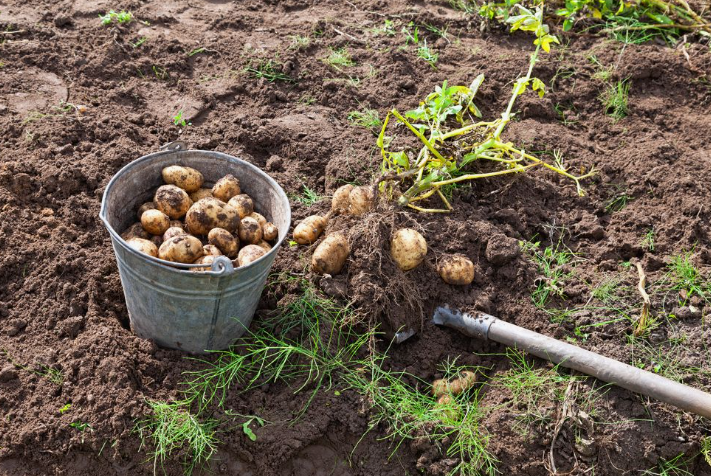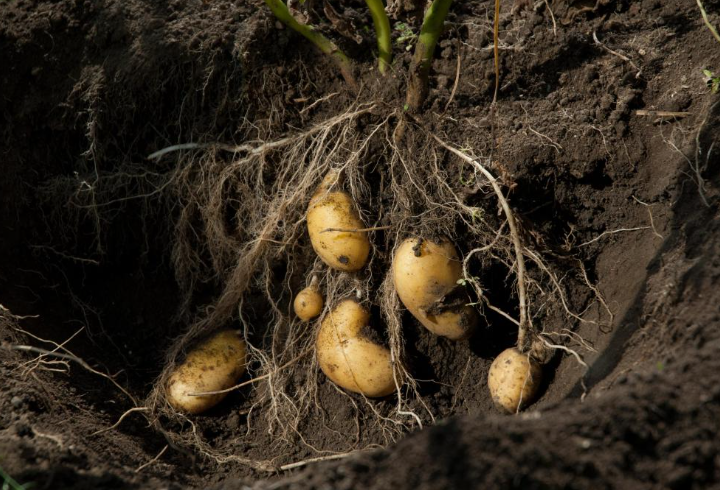Do Potatoes Grow Back Every Year? Yes, but Don’t Let Them

As any gardener who has grown potatoes can attest, harvesting can sometimes miss one or more tubers that we had intended to harvest, leading us to find several volunteer plant sprouts in spring from these left behind tubers.
As I began researching potatoes again and again, I became curious as to whether or not they can return year after year without having to be replanted every season. Do Potatoes Grow Back Every Year – Here’s what I found out:
Even though volunteer potatoes may pop up each spring, this does not indicate they will continue coming back year after year. Therefore, it is advisable to replant with new seed potatoes every spring in order to maximize success in your garden.
Here, I will provide additional insight on why it is beneficial to plant new potatoes every year and what might happen if your tubers remain in the ground over winter.
Are potatoes perennial plants?
Contrary to popular belief, potatoes are perennial. This means that they can continue producing new roots every year without needing to be replanted each time; however, this is not typically how potatoes are farmed.
Most of us grow potatoes as an annual crop, meaning we must plant fresh seed potatoes every year in order to reap a harvest. You might be asking yourself, Do potatoes grow back every year this way when, technically speaking it should be considered perennial?
Well, though the greens may return year after year, that doesn’t guarantee big tubers; perhaps none at all!
Potatoes left in the ground over the winter could potentially begin to compete for water and nutrients as new shoots sprout and tubers begin to form, creating competition between them for scarce resources such as soil moisture and food sources. Potatoes are known to be heavy feeders.
Lifecycle of a Potato Plant
For most of us, the life of our potato plants begins in spring with planting their first seed potatoes. Soon after planting, sprouts from their eyes begin appearing and grow into sprouting potatoes.
Eyes of potatoes resemble tiny dimples on the outside of a tuber, sometimes connected to it by a tiny nub. These dimples mark the beginning of sprouting on this tuber.
Sometimes potatoes sprout even before being planted! Don’t be alarmed if you see sprouts appearing before placing the seed potatoes into the ground – this is perfectly normal and expected behavior!
After roughly 3 weeks from planting, leaves of the potato plant should begin to emerge from the ground, and new tubers begin forming at this stage.
At some point, potato plants will reach a point where they cease growing greens to focus exclusively on tuber development. Flowers may form during this phase but don’t always appear; such blooms aren’t essential to healthy tuber growth.
After 90 to 110 days, potato plants reach maturity. At this point, their leaves may begin to yellow and eventually die back before eventually dissipating completely.
Once their leaves have started to wither away, your potatoes should be ready for harvesting. Harvest them as soon as possible to prevent rot in the tubers – although you can leave them in place for up to two weeks more to allow time for curing prior to storage.
Can you leave potatoes in the ground over winter?
Potatoes have the ability to survive the harsher elements by going dormant in order to survive winter weather conditions; however, when springtime arrives they may not produce optimal tuber growth rates.
Potatoes left in the ground after harvest time run the risk of rotting in the soil and becoming inedible, which will have adverse repercussions in terms of tuber growth if any new shoots appear from these decayed taters at all.
This phenomenon is much more likely in wetter climates or areas with frozen soil in winter months. Once frozen solid, digging tubers out can become significantly harder and may damage the surrounding environment if left to sit too long in their place.
Do Potatoes Grow Back Every year? As mentioned previously, overwintered tubers that do sprout new shoots in spring will compete for space and nutrients, producing smaller potatoes that don’t last as long in storage.

Storing Potatoes in a Garden Trench
As an alternative to simply leaving their tubers unharvested in the ground, some people opt to build garden trenches as storage systems for potatoes. Garden trenches provide insulation to protect tubers from freezing over, so this method may prove advantageous in keeping harvest times to a minimum.
To create a garden trench successfully, it is necessary to dig an area at least 2 feet deep and wide enough so you can spread out your potatoes evenly in an even layer.
Once your trench is dug, lay down a thick layer of straw for insulation before placing your tubers into it. Once they are evenly spaced out in rows, cover them with another thick layer of straw so you won’t see any potato plants!
A note on experimenting
While I’ve written extensively about why it would be unwise to grow potatoes perennially, that shouldn’t deter gardeners who wish to explore alternative potato-growing techniques from exploring them further.
If a large harvest isn’t your ultimate aim, perhaps experiment with leaving some potatoes in the ground over winter and observe their progress come springtime. Every garden is unique – maybe yours holds the key to perpetual potato growing?
Takeaway
Do Potatoes Grow Back Every Year? Although potatoes are technically perennials, it’s wiser to plant them annually as annuals to guarantee a harvest. Letting potatoes remain dormant overwinter can result in either promising new plants in spring, or nothing at all!
Tubers left in the ground during winter risk rotting away and producing nothing when spring arrives. Furthermore, they could compete with each other for space and nutrients underground and crowd each other out as a result.
If you have the space, consider growing potatoes as perennials in your garden. If this proves successful, let Tiny Garden Habit know so we can also give it a go!
